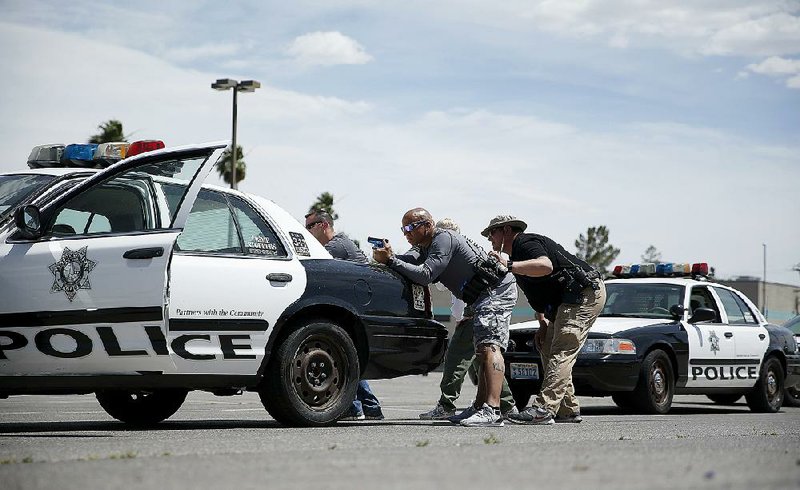LAS VEGAS -- Las Vegas Metropolitan Police Department, the first in the country to complete a "collaborative" Justice Department review, has rewritten its use-of-force rules and ramped up training to de-escalate tense encounters.
Some criticized it as not enough. But shootings by officers, which peaked at 25 in 2010, declined to 13 in 2013 and 16 last year. Through mid-June, Metro officers shot three people, killing one. Even critics credit the decrease at least partly to new training.
Shootings by police recently led Ohio officials, dismayed that the state requires just four hours of annual police training, to recommend a tenfold increase. A Missouri panel recommended training encouraging police to increase distance between themselves and suspects, though some critics say stepping back could heighten risk.
Debate continues over how to stem shootings.
"I think what has happened is the culture has changed now, as a result of the training and as a result of the policy, that you have officers who are ... essentially avoiding situations where they have to make that split-second decision," says William Sousa, a professor at the University of Nevada, Las Vegas.
Others are skeptical, including Rondha Gibson, who won a $1.5 million settlement from Las Vegas police after her husband, Stanley Gibson, was killed by officers in 2011.
"They can say we believe in training," Gibson says. "But at the end of the day they are trained for the cops to go home."
Policing experts say training often falls short.
A 2008 survey of more than 300 departments found one-third limited deadly force training to requalifying in shooting skills, without focusing on judgment or tactics.
More than three-fourths did not share findings from police-shooting investigations with trainers.
That raises serious "concerns about how prepared many police officers are" for encounters where they might use deadly force, concluded survey author Gregory Morrison, a professor of criminal justice at Ball State University.
More departments have embraced "reality-based training," using computer simulations or live scenarios.
But there's little research on what works, Morrison said.
Critics long complained about aggressive policing in Las Vegas.
But in late 2011, The Las Vegas Review-Journal published an investigation detailing 115 killings by officers over two decades.
Weeks later, Stanley Gibson, short of medication for his mental illness, called police, demanding an officer go to his home. Over the next 37 hours, officers found him wandering through traffic and throwing chips from a casino table.
He was arrested, released, briefly hospitalized, then refused an ambulance.
Finally, police were called to an apartment complex next to one the Gibsons had moved to less than a month earlier, by a woman reporting two black men trying to break in.
Officers blocked Gibson's Cadillac. He ignored commands barked through bullhorns. Commanders devised a plan to fire a bean bag through the rear window and gas him out. But "a series of failures ensued," the Clark County district attorney found. When the bag shattered a side window, an officer fired, striking Gibson four times.
Afterward, the Police Department and an arm of the Justice Department announced what they called "collaborative reform."
The resulting audit found many officers designated to deal with Las Vegas' sizable mentally ill population had gone nine years without recertification training.
Las Vegas had a history of traffic stops leading to shootings and errors in situations involving large numbers of officers.
But the department did little to prepare for those unpredictable scenarios, a Justice consultant found.
Officers were getting no instruction in de-escalating tense situations.
When the review began, the department was just rolling out reality-based training, four-hour sessions now required annually for all officers.
Las Vegas has since trained hundreds to deal with people with mental illnesses. It has struggled to incorporate de-escalation into other training.
Some instructors "expressed outright disapproval" of the new use-of-force protocol, the consultant found.
Capt. Matt McCarthy, head of the department's Office of Internal Oversight, acknowledges dissent but says that problem was corrected.
Critics say training appears to have reduced shootings.
Trainees are measured in praising its value.
Jason de la Garrigue says such training reminds him of the split-second decisions of street patrol he largely left behind during five years on the vice squad. But he questioned its impact.
"I can't say it's going to help us reduce (shootings)," he says, "but it's a start."
A Section on 06/21/2015

